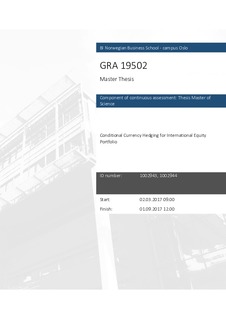| dc.contributor.author | Kopats, Raman | |
| dc.contributor.author | Chudovets, Tsvitana | |
| dc.date.accessioned | 2018-01-12T09:55:33Z | |
| dc.date.available | 2018-01-12T09:55:33Z | |
| dc.date.issued | 2017 | |
| dc.identifier.uri | http://hdl.handle.net/11250/2477144 | |
| dc.description | Masteroppgave(MSc) in Master of Science in Business, Finance - Handelshøyskolen BI, 2017 | nb_NO |
| dc.description.abstract | The given study focuses on international equity portfolios based in seven
developed economies and examines whether conditional approach to unitary,
universal, and minimum variance currency hedging outperforms the commonly
used unconditional approach in terms of minimizing risk without compromising
returns. Capturing the period from 1980 until 2016, the out-of-sample Sharpe ratio
results reveal that for six out of seven observed countries the conditional approach
outperforms the unconditional for all examined hedging strategies. The obtained
results lack statistical significance, which can be attributed to inconsistent
performance of conditional hedging during the global financial crisis, as well as
the problems with the forecasting indicator and estimation errors in hedging
weights. Yet, the study reveals a big potential of conditional currency hedging for
equity investors and points toward the factors which can further improve the given
strategy. | nb_NO |
| dc.language.iso | eng | nb_NO |
| dc.publisher | BI Norwegian Business School | nb_NO |
| dc.subject | finance | nb_NO |
| dc.subject | finans | nb_NO |
| dc.title | Conditional currency hedging for international equity portfolio | nb_NO |
| dc.type | Master thesis | nb_NO |

